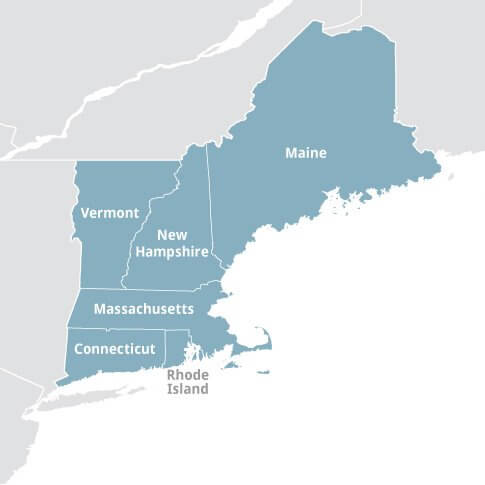NROC Overview
 The Northeast Regional Ocean Council (NROC) is a state and federal partnership that facilitates the New England states, federal agencies, regional organizations, and other interested regional groups in addressing ocean and coastal issues that benefit from a regional response. It is NROC’s mission to provide a voluntary forum for New England states and federal partners to coordinate and collaborate on regional approaches to support balanced uses and conservation of the Northeast region’s ocean and coastal resources.
The Northeast Regional Ocean Council (NROC) is a state and federal partnership that facilitates the New England states, federal agencies, regional organizations, and other interested regional groups in addressing ocean and coastal issues that benefit from a regional response. It is NROC’s mission to provide a voluntary forum for New England states and federal partners to coordinate and collaborate on regional approaches to support balanced uses and conservation of the Northeast region’s ocean and coastal resources.
NROC was formed in 2005 by the Governors of the New England states — Maine, New Hampshire, Vermont, Massachusetts, Rhode Island, and Connecticut — to serve as a forum for the development of goals and priorities and address regional coastal and ocean management challenges with creative solutions. Recognizing the importance of the national role in these regional issues, NROC was expanded to include federal agencies as members of the Council. In addition to its members, NROC works with bordering states and countries as needed.
What We Do
NROC facilitates the development of coordinated and collaborative responses to coastal and ocean management issues that benefit from regional solutions. This results in more effective use of resources and catalyzes faster progress.
NROC was formed to augment the functions and activities of existing entities in the region and to build upon current state, multi-state, and federal governance and institutional mechanisms to improve management of ocean and coastal resources by:
- identifying local, state, and regional ecosystem-based environmental issues;
- seeking new, and encouraging existing, ocean and coastal initiatives and partnerships;
- facilitating information exchange, including reports, discussions, initiatives, and plans which may be developed or considered; and
- fostering regional communication, interaction, and cooperation on marine and ocean-related research and development, education, exploration, and observation.
NROC’s current efforts are focused on three issue areas:
These issue areas form the basis for NROC’s standing committees, which define and implement specific work plans. It is important to note that NROC has identified climate change as a priority and recognizes it as a major driver that is not limited to a single issue area, and thus NROC strives to include and integrate climate change issues across all work plans.
Examples of Recent Accomplishments
Since NROC’s inception, the region has made important progress in advancing coordinated and collaborative actions and responses to priority coastal and ocean management issues. While the benchmarks of progress are many, the following are a few recent examples:
- Creation of the Northeast Ocean Data Portal, a decision support and information system for managers, planners, scientists, and project proponents.
- Building capacity of New England communities through training and a small grants program to improve the region’s resilience and response to impacts of coastal hazards and climate change.
- Convening of the Northeast Workshop on Regional Ocean Planning, where representatives from government (state, federal, tribal), industry, academic, non-profit, and private organizations, and others, received overviews of existing, related work in New England and shared perspectives on ways to improve the understanding and management of ocean resources and uses.
- Convening of an Ecosystem Health Indicators Conference that brought together policy makers, managers, and scientists to strengthen collaboration and to better understand the programs and specific indicators that are best suited to answer management questions and track the overall health and trends of socioeconomic and ecological systems in the region.
- Enhancement of regional collaboration on marine habitat mapping, characterization, and classification.
Regional ocean partnerships like NROC are recognized in reports issued by the US Commission on Ocean Policy and the Pew Oceans Commission as key mechanisms to enable coordinated, ecosystem-based management approaches to identify regional goals and priorities, improve responses to regional needs, and develop and disseminate regionally significant research and information.
How We Work
The Council outlines its issue areas, defines its strategic priorities, and develops and implements two-year work plans detailing specific strategies and activities. Council meetings are open to all stakeholders and interested members of the public. Meeting agendas specifically include opportunities for partners and audience to provide updates and feedback. Council meetings are held in different locations throughout the region to ensure balanced opportunities for attendance, and meeting notices are posted on the NROC website.
NROC is led by state and federal co-chairs who serve on an 18-month rotation. The state co-chair rotates based on geography from north to south (i.e., Maine, New Hampshire, Massachusetts, Rhode Island, Connecticut). The federal co-chair rotates by federal line departments (i.e., Department of Commerce, Department of the Interior, Department of Homeland Security, etc.).
The majority of NROC’s work is done through its four committees: Executive, Ocean and Coastal Ecosystem Health, Coastal Hazards Resilience, and Ocean Planning. NROC’s Executive Committee handles administrative and operational matters between Council meetings, makes certain decisions while deferring others to the full Council, and develops recommendations on agendas, projects, and partnerships. The Executive Committee consists of six members—the current, immediate past, and future NROC state and federal co-chairs. NROC also has standing committees for each of its key issue areas: Ocean and Coastal Ecosystem Health, Coastal Hazards Resilience, and Ocean Planning. These committees are composed of members from NROC agencies as well as non-government, academic, and private-sector subject matter experts. The committees define and implement specific two-year work plans for their issue area.
NROC benefits from, and values, having close and collaborative relationships with other regional organizations. NROC has Memoranda of Understanding with the Northeastern Regional Association of Coastal and Ocean Observing Systems (NERACOOS), the Northeast Regional Sea Grant Consortium, the Coastal States Stewardship Foundation, and the Gulf of Maine Council on the Marine Environment.
NROC continues to be a leader in regional ocean partnerships, demonstrating the benefits of how close coordination and collaboration among state and federal government agencies — working together with other regional entities, organizations, interests, and stakeholders — can develop and implement regional approaches to many of our ocean management challenges.
